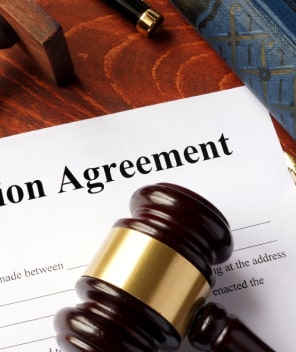Mediators & Arbitrators for Delaware Businesses
ADR Arbitration & Mediation in Delaware
Although we have two physical offices in Georgia, we offer online services for virtual mediation and virtual arbitration regarding Delaware business entities no matter where you are located. In addition, our third party neutrals can also travel to you. Many businesses chose to use our services in order to utilize the unmatched knowledge and experience of Micheal Ledyard who authored the statutes on the Delaware Statutory Trusts and Delaware Limited Liability Companies has decades of experience advising Delaware businesses on complex structuring and financing.
Advantages of Virtual ADR: Mediation and Arbitration in the Digital Age
Virtual Alternative Dispute Resolution (ADR) sessions, including mediation and arbitration, offer numerous benefits, making them an increasingly popular alternative to traditional in-person processes.
1. Convenience and Accessibility
Virtual ADR allows participants to join from anywhere, eliminating the need for travel and enabling remote participation. This is particularly valuable for international disputes, allowing parties in different time zones and locations to meet without logistical barriers.
2. Cost-Effectiveness
By removing the need for travel, accommodation, and venue costs, virtual ADR dramatically reduces expenses. It can generally be scheduled more quickly.
3. Flexibility and Efficiency
Virtual ADR platforms offer easy scheduling, document sharing, and real-time collaboration, improving the overall efficiency of the process.
4. Enhanced Privacy and Confidentiality
Virtual sessions offer greater privacy, as participants can join from private locations. Digital platforms also use advanced security measures, such as encryption, to protect sensitive information, enhancing confidentiality.
5. Environmental Impact
Virtual ADR reduces the environmental footprint by eliminating the need for travel and paper documents, aligning with sustainability efforts.
Get In Touch
Email: [email protected]
How our Mediators & Arbitrators Can Help Delaware Business Entities
In complex business transactions, disputes can arise from any point from formation, negotiation all the way through performance. When these issues erupt, mediation or arbitration can be effective methods for resolving conflicts efficiently. Here’s a list of potential disputes that can arise in complex business transactions have subject-matter experience with resolving:
1. Contractual Disputes
- Breach of Contract: Alleged failure to fulfill obligations under the terms of the agreement, such as non-payment, failure to deliver goods or services, or incomplete performance.
- Contract Interpretation: Disagreements over the meaning or scope of terms in a contract, such as ambiguities or inconsistencies in clauses.
- Enforceability: Disputes regarding whether a contract is legally binding or if it is void or voidable due to fraud, duress, mistake, or other legal reasons.
- Termination/Exit Clauses: Disputes over the right or process to terminate or exit a contract, including conditions for early termination, breach, or force majeure events.
2. Intellectual Property (IP) Disputes
- Infringement: Claims related to the unauthorized use or infringement of intellectual property (e.g., patents, trademarks, copyrights, trade secrets).
- Licensing Issues: Disagreements over the terms and conditions of IP licensing agreements, including royalties, usage rights, and territorial limitations.
- Confidentiality and Non-Disclosure Agreements (NDAs): Disputes regarding breaches of confidentiality or the terms of an NDA.
- Ownership Disputes: Disputes over who owns the rights to intellectual property developed during or as part of a business relationship.
3. Shareholder/Partner Disputes
- Disagreement on Management: Conflicts over the control or direction of the company, including board control, voting rights, or executive decision-making.
- Dividends and Profit Sharing: Disputes regarding the allocation of profits, dividend distribution, or the interpretation of profit-sharing clauses in shareholder or partnership agreements.
- Exit and Buyout Disputes: Disagreements regarding the terms for buying out a shareholder, partner, or member, especially during a sale or dissolution of the business.
- Valuation: Conflicts regarding the valuation of shares, assets, or business interests, particularly in the context of mergers, acquisitions, or buyouts.
4. Mergers and Acquisitions (M&A) Disputes
- Purchase Price Adjustments: Disputes over post-closing adjustments to the purchase price, including issues with earn-outs, working capital, or debt assumptions.
- Representations and Warranties: Disagreements arising from alleged breaches of representations or warranties made in the transaction documents, including claims for indemnification.
- Non-compete or Non-solicitation Clauses: Conflicts regarding the enforcement of non-compete or non-solicitation clauses that may follow a business sale or merger.
- Closing Conditions: Disputes about the fulfillment of conditions precedent or post-closing obligations in M&A agreements.
5. Supply Chain and Procurement Disputes
- Delivery and Timeliness: Conflicts over late or non-delivery of goods or services, including disputes over performance deadlines and penalties.
- Quality and Specifications: Disagreements over whether goods or services meet agreed-upon quality standards, specifications, or contractual terms.
- Force Majeure: Disputes over whether an event outside the control of one party (e.g., natural disasters, pandemics, political upheaval) excuses non-performance under a contract.
- Payment Disputes: Conflicts over invoicing, payment terms, or disputed amounts in supply chain transactions.
6. Construction and Real Estate Disputes
- Construction Defects: Disagreements over the quality or condition of construction work or failure to meet contractual specifications.
- Project Delays: Conflicts arising from delays in construction, including whether the delays are excusable (e.g., due to weather, subcontractor failure, or supply chain issues).
- Payment for Work: Disputes over unpaid work, retention amounts, or disagreements over progress payments during construction projects.
- Landlord/Tenant Disputes: Issues regarding lease terms, rent disputes, property maintenance obligations, or tenant compliance with lease terms.
7. Employment and Labor Disputes
- Employment Agreements: Conflicts over the interpretation or enforcement of employment contracts, including issues with non-compete clauses, compensation terms, and job duties.
- Wrongful Termination: Claims of unlawful or unfair dismissal, including disputes over severance, notice periods, or termination for cause.
- Discrimination and Harassment: Disputes involving allegations of discrimination, harassment, or retaliation in the workplace.
- Labor Union Disputes: Conflicts between employers and unions over collective bargaining agreements, labor practices, or grievances.
8. Financial Disputes
- Debt and Loan Disputes: Disagreements over loan terms, repayment schedules, interest rates, or defaults in debt agreements.
- Investor Disputes: Disagreements between investors and businesses regarding the management of investments, returns, or breaches of investment agreements.
- Bankruptcy and Insolvency: Conflicts regarding the handling of insolvency proceedings, creditor priorities, or the division of assets during liquidation or reorganization.
- Fraud and Misrepresentation: Claims related to fraudulent financial practices, misrepresentation of financial statements, or failure to disclose key information during a transaction.
9. International Trade and Cross-Border Disputes
- International Contracts: Disagreements arising from the interpretation or enforcement of international contracts, particularly those involving different legal systems or jurisdictions.
- Customs and Import/Export Disputes: Conflicts over trade compliance, customs duties, tariffs, or breaches of international trade agreements.
- Disputes over Currency and Payment Terms: Disputes arising from exchange rate fluctuations, payment terms, or difficulties with cross-border payments.
10. Franchise Disputes
- Franchise Agreements: Disagreements between franchisors and franchisees regarding the terms and conditions of the franchise agreement.
- Royalty and Fee Disputes: Conflicts over the calculation or payment of royalties, marketing fees, or other financial obligations.
- Franchise Termination: Disputes regarding the termination or non-renewal of a franchise agreement, including potential claims for damages.
- Franchise Misrepresentation: Claims by franchisees that the franchisor misrepresented the business opportunity, leading to financial losses.
11. Consumer Protection Disputes
- False Advertising and Unfair Trade Practices: Disputes regarding deceptive or misleading advertising practices or violations of consumer protection laws.
- Warranty and Guarantee Claims: Disagreements over the enforcement of product warranties, guarantees, or returns policies.
- Privacy and Data Protection: Disputes arising from breaches of privacy, data protection laws, or mishandling of consumer information.
12. Environmental and Regulatory Disputes
- Environmental Compliance: Conflicts regarding compliance with environmental laws and regulations, such as clean air and water standards or waste disposal regulations.
- Regulatory Enforcement: Disputes arising from government enforcement actions or regulatory penalties related to business operations.
- Permitting and Licensing: Disagreements over the issuance or denial of necessary business permits or licenses from regulatory authorities.
Explore what services we’re offering
Our Mediators & Arbitrators
Frequently Asked Questions
The benefits include faster resolution times compared to court litigation, confidentiality, reduced legal costs, and the expertise of qualified arbitrators who are specialists in their fields.
GCAAM’s arbitrators and mediators are highly experienced professionals with extensive backgrounds in law, business, and specialized areas of dispute resolution. They are neutrals who are trained to handle complex cases and facilitate fair outcomes.
The length of the mediation process can vary depending on the complexity of the dispute, but it generally takes less time than court proceedings. Many cases are resolved within one to three sessions.
To initiate ADR services with GCAAM, you can contact us through our website or by phone to schedule a consultation. We will guide you through the steps to start the arbitration or mediation process.

Contact Neutrals
Email: [email protected]












